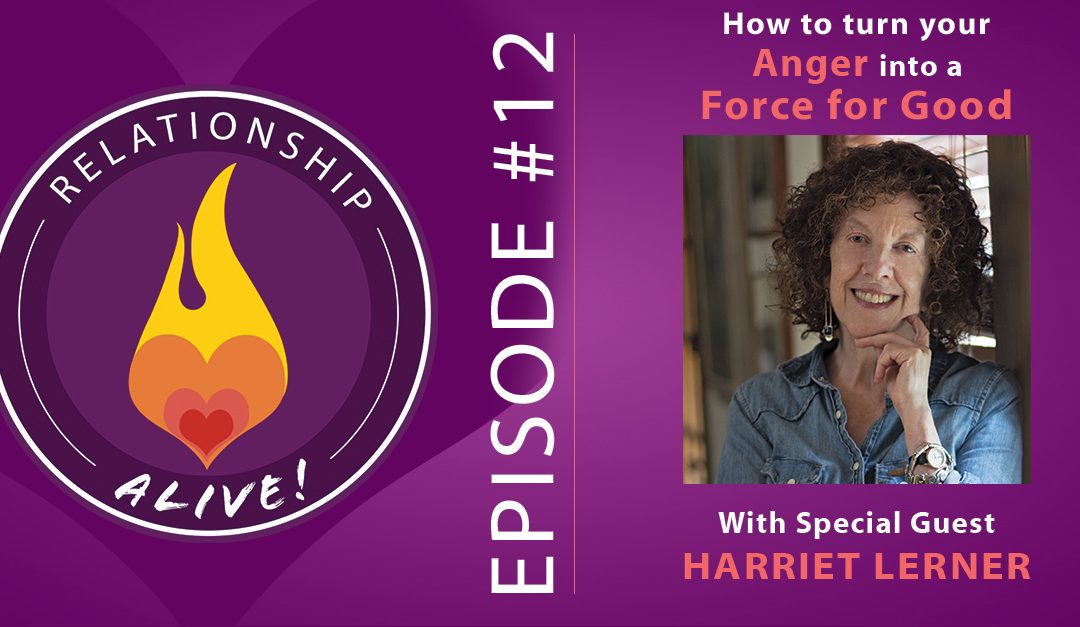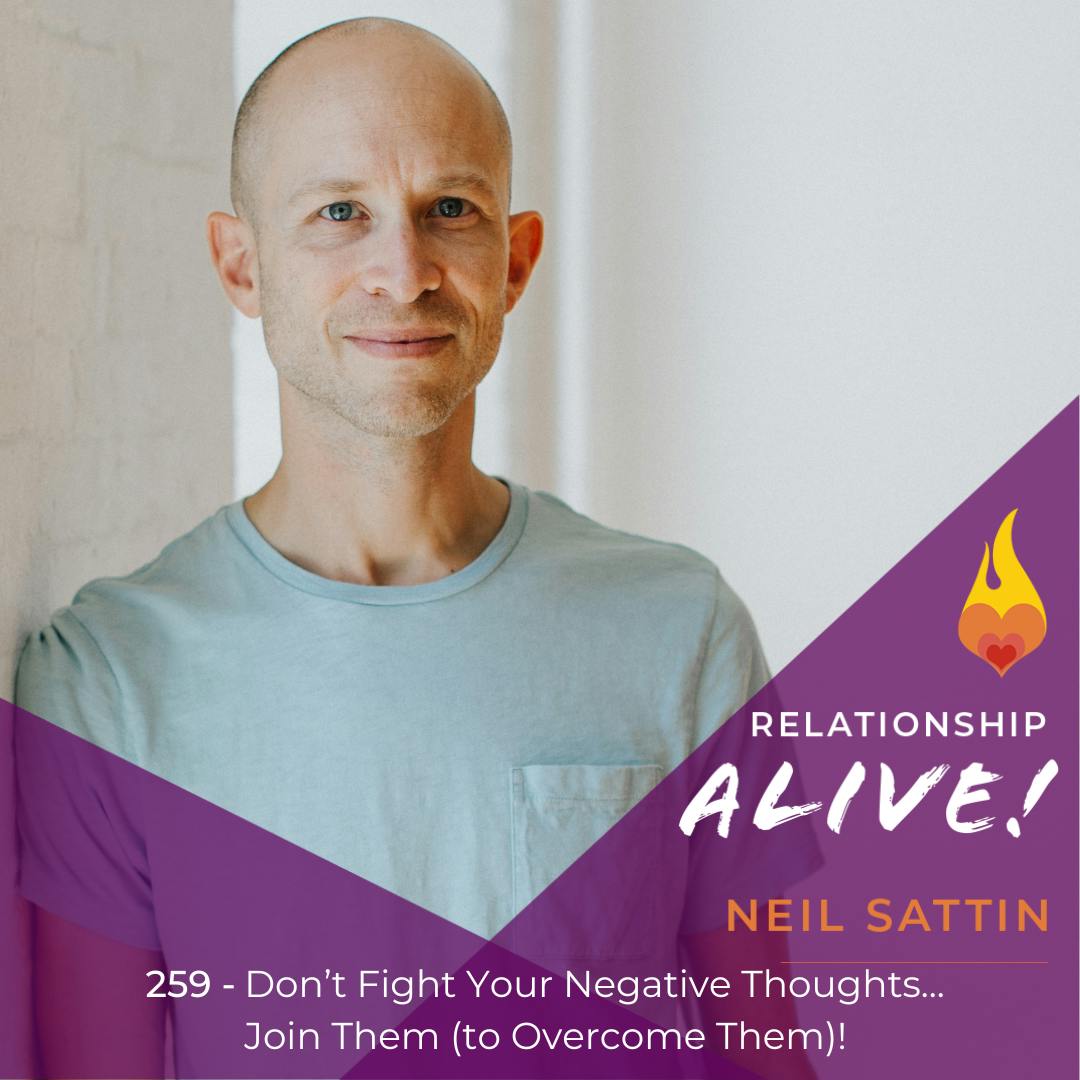When was the last time you got really angry? And...how did that go for you? Was it a positive experience, or...not? And...do you and your partner know how to use your anger to foster growth in your connection?
The reason I’m asking is that today’s guest is Harriet Lerner, Clinical Psychologist and author of the classic book The Dance of Anger which has sold over 3 MILLION copies worldwide. Harriet is one of the world’s most trusted experts on the topic of relationships, and her work has inspired countless others on the topics of Anger, Intimacy, Trust, Fear, Courage - you name it. Today we’re going to dive deep to talk about how to make your anger a force for good in your relationship. On top of that you’ll also get some words of wisdom that aren’t just about anger, but that are also about how to identify and change the patterns that are holding you back in your relationship.
If you need help with understanding and processing anger, then join my enlightening conversation with Harriet as she addresses the following:
- Anger—what is it? Can it be useful? Anger doesn’t have to be a negative emotion. After all, it’s part of what makes us human and helps us define “self.” Anger is a vehicle for personal, social, and political change. “The pain of our anger preserves the dignity and integrity of the self.” In other words, when you’re feeling angry, that probably means that there is some place where you are ignoring your needs and betraying yourself.
- Many people use anger in relationships for purposes that aren’t useful. Many people get angry with ease, but they don’t accomplish anything useful with their anger! If anger is a way to blow off steam, but doesn’t actually generate positive change, then it’s not serving its purpose.
- Or some people avoid anger altogether. Another way that we mismanage anger is by AVOIDING conflict. This leads us to avoid any CLEAR statement of self that will “rock the boat” in a relationship. So it temporarily buys you peace, but at the cost of being fully yourself in relationship. And if you can’t be fully yourself, then you can’t fully meet your partner.
- What is the connection between gender and ways of handling anger? Our culture is more comfortable with women who are guilty, apologetic, and self-doubting than with women who are angry and want to challenge the status quo. Too often, anger is associated with feminism (“those angry feminists”) and is taboo for women. That all being said, managing anger wisely is a universal challenge for ALL of us, regardless of gender.
- The BIG Question = How do we transition from nonproductive to productive anger? Anger is a difficult emotion because we are wired for FIGHT or FLIGHT when we encounter most any problems. In order to turn anger into something useful, we need to become good observers of what is going on. The first step is noticing that you’re getting angry. Once you can become a witness to your anger, you are empowered to change YOUR part in the patterns that lead to anger being toxic versus being a vehicle for growth.
- What might you notice in yourself as a precursor to anger? Often, when you’re in full-on anger, it’s not the right time to try to resolve a situation. Can you identify the micro-changes within you that lead up to fight-or-flight? Does your heart-rate change? Does your face feel flushed? Where is your attention focused? Do you start to get defensive? In these moments, when you recognize that something is going on, do your best to see it as a sign that something within you needs to be recognized. Take space if necessary, to get clarity. Don’t focus on being “right” or “winning” - focus on getting yourself back to a place of connection within - and love/compassion for your partner.
- Learn to deal with countermoves and resistance to change in yourself and your partner. “Countermoves” are ways that a partner tries to hook you back into the old patterns when you are trying to change. If you have patterns in the way that you interact with your partner, you can prepare ahead of time for what they will probably do to try and continue the pattern. When that happens, can you continue to not take things personally? Can you stand firm in not being pulled into an old pattern? Can you do that in a way that is kind and compassionate?
- One challenge in relationships regarding anger is DEFINING A BOTTOM LINE. A “bottom line” is the place where your beliefs, priorities, and values are not negotiable. Can you define a bottom line in a way that doesn’t create an ultimatum, but instead offers your partner a pathway for change?
- What if you don’t know what your bottom line is? It takes courage to acknowledge that you aren’t clear about how to proceed, and to not know what your position actually is. Sometimes it’s ok NOT to do anything!
- What are the roots of change in your relationship? Change comes in small steps, so don’t expect immediate and dramatic results (although they do sometimes happen!). Change is made of courageous acts instead of blaming others and staying victimized. What is more important in your relationship - being locked into a pattern of pursuing, distancing, anger, and blame---or having the courage to break free from those? These changes are not easy, and it takes courage to shift your actions and not know how your partner will respond. Can you take a position that doesn’t involve blaming others - but that still allows you to take a stand for what you need and desire in your relationship?
- After you get clear on what you need - Start looking for positive, constructive ways to address your needs within yourself, and within your relationship. Even if a situation is 97% the other person - that still leaves 3% for you to work on and change. And once you change, the whole dynamic changes.
- One of the strategies Harriet shares in her book is to go back to your family origins. We all have a legacy that is handed to us from the formative people in our lives about handling anger and conflict. Often, the way our family members handled conflict is transferred to us. For this reason, it’s helpful to know the history of the “hot” issues in our family and take steps to become a “pioneer” in dealing with those issues in a different way. Can you become a detective and explore what has come before you in the way other family members have handled situations - particularly contentious situations?
- Here’s how to change patterns in a healthy way: The best way to get your partner’s attention is to try out a NEW you. Do something different. Pick out something small and try it out when the countermoves roll in.
Links and Resources:
https://www.neilsattin.com/anger is the direct link to this episode. Visit to download the show guide, or text “PASSION” to 33444 and follow the instructions to download the show guide. If you download the guide within the first week of this episode's airing, you are automatically qualified for a chance to win a copy of “The Dance of Anger”!
Our Relationship Alive Community on Facebook
Amazing intro/outro music graciously provided courtesy of:
The Railsplitters - Check them Out!


